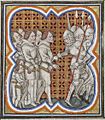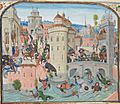Jacquerie facts for kids
The Jacquerie was a big uprising by peasants in northern France. It happened in the early summer of 1358. This revolt took place during a long conflict called the Hundred Years' War.
The main area for this uprising was near the Oise River, north of Paris. The revolt lasted only a few weeks before it was stopped. After this event, the word jacquerie became a common term for any peasant uprising, both in English and French.
Contents
What Was the Jacquerie?
The Jacquerie was a revolt by ordinary people, mostly farmers and villagers. These people were known as peasants. They were upset with the difficult times they faced. The name "Jacquerie" comes from "Jacques Bonhomme," which was a common nickname for a French peasant.
Why Did the Peasants Revolt?
Life for peasants in France in 1358 was very hard. Here are some reasons why they revolted:
- War and Damage: The Hundred Years' War between France and England had caused a lot of destruction. English and French soldiers often raided villages. They stole food and destroyed farms.
- High Taxes: The French king needed money for the war. So, he made peasants pay very high taxes. This made their already tough lives even worse.
- Lack of Protection: The nobles, who were supposed to protect the peasants, often failed to do so. Sometimes, the nobles themselves were part of the problem.
- Loss of Trust: Many people had lost faith in their leaders. The French king had been captured by the English. This made the country feel very unstable.
What Happened During the Uprising?
The revolt started suddenly in May 1358. Peasants in different villages began to attack the castles and homes of nobles. They were very angry and violent.
- The peasants destroyed property.
- They targeted nobles and their families.
- The uprising spread quickly across many parts of northern France.
- The rebels were not very organized. They did not have a clear leader or a strong plan.
How Was the Jacquerie Stopped?
The nobles were shocked by the uprising. They quickly gathered their forces to fight back.
- A powerful noble, Charles II of Navarre, led the attack against the peasants.
- On June 9, 1358, a major battle took place near the town of Meaux.
- The peasant army was defeated. Many rebels were killed.
- After this defeat, the revolt quickly ended. The nobles punished many peasants harshly.
The Jacquerie showed how much anger and frustration there was among the common people in France. It was a short but very intense period of violence. It highlighted the deep problems in French society during the Hundred Years' War.
Images for kids
See also
 In Spanish: Grande Jacquerie para niños
In Spanish: Grande Jacquerie para niños
 | William M. Jackson |
 | Juan E. Gilbert |
 | Neil deGrasse Tyson |



